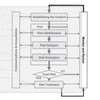 The other day I came across a new term: Agile Business Continuity, on the blog of Paul James, agilecontinuity.org. The coupling of the term agile with business continuity aroused my curiosity and I decided to dig deeper into what this blog was really about. I discovered that was a blog that is well worth reading and I think that the word agile really captures the essence of what business continuity management (BCM) is about in the first place and I will explain why I think so.
The other day I came across a new term: Agile Business Continuity, on the blog of Paul James, agilecontinuity.org. The coupling of the term agile with business continuity aroused my curiosity and I decided to dig deeper into what this blog was really about. I discovered that was a blog that is well worth reading and I think that the word agile really captures the essence of what business continuity management (BCM) is about in the first place and I will explain why I think so.
Update 2011/07/01: agilecontinuity.org has not been updated since May 2010, but it’s nonetheless worth reading it.
Update 2012/08/06: agilecontinuity.org is no longer an active website; while I will let this review stand, I have disabled the links to it..
agilecontinuity.org
While writing his blog, Paul also works with TexoNet, designing and delivering ImpactAware based solutions to the business continuity market, and on his blog, Paul shares some of his insights after spending some 18 months talking to a huge range of Business Continuity experts and practitioners. Paul takes a pragmatic and practice-oriented stand towards
agile or flexible?
In the supply chain community, where I spend much of my time, there is a continuous debate over the terms flexible and agile. Some consider them to be the same, some consider them to be different. Sometimes, the terms resilent and robust are also brought into the discussion. Flexibility, agility, robustness and resilience are different sides of the same coin, yet at the same time distinctively different animals
flexible = planned, agile = unplanned
How can we differ agility from flexibility? As I see it, flexibility is scheduled or planned adaption to unforeseen yet expected external circumstances. Agility is unplanned and unscheduled adaption to unforeseen and unexpected external circumstances. Robustness refers to the ability to endure changes in external circumstances without adapting, while resilience is the ability to survive despite withstanding a severe and enduring impact. This post explains the difference: De-confusing SCRM: robustness, resilience, flexibility and agility.
Business Continuity = Agility?
Back to agilecontinuity.org. Why do I think agile is the correct term? If disasters have taught us anything, it is that they never strike according to plan, meaning that they more often than not warrant unplanned actions rather than planned actions. Unplanned actions cannot be found in a dust-gathering business continuity plan on some shelf, unplanned actions can only be found in the minds of those involved. If people are taught to think continuity in their daily work actions, people will know what to. To me, that is the essence of agility, and that is why business continuity needs to be agile. agilecontinuity.org captures this.
Link
- agilecontinuity.org: agilecontinuity.org
Author Link
- linkedin.com: Paul James
Related
- husdal.com: Business Continuity blogs of note
(If you would like to have your blog/website reviewed, please contact me)











